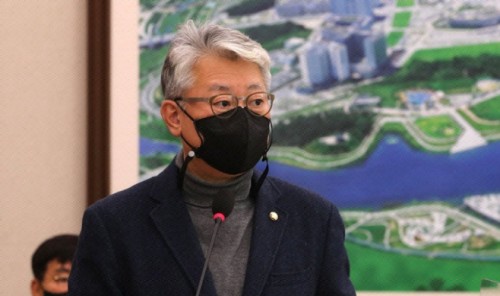 |
| Rep. Cho Eung-chon of the main opposition Democratic Party reports a bill review at the plenary meeting of the Land, Infrastructure and Transport Committee held at the National Assembly in Yeouido, Seoul, on January 4, 2022./ Source: Yonhap News |
AsiaToday reporters Jeong Geum-min & Kim Im-soo
The main opposition Democratic Party (DP) is reportedly planning to introduce a legal revision to control the executive legislation, raising controversy. The key of the revision is allowing the National Assembly to have the right to request revisions of enforcement ordinances. If the legislation is enforced, President Yoon Suk-yeol could even exercise the veto right. Experts are concerned that it would infringe on the powers delegated to the National Assembly.
The bill suggested by DP lawmaker Cho Eung-cheon states that if the enforcement ordinance is inconsistent with the purpose and content of higher laws, the National Assembly Standing Committee can request the government to revise and change it. The current law requires the National Assembly to “review” where an enforcement ordinance violates any laws. But Cho’s bill wants to “request for amendment”. In this case, presidential decrees cannot be arbitrarily made without the cooperation of the DP, which controls the National Assembly with 170 out of 299 seats.
In a phone interview with AsiaToday on Monday, an official from Cho’s office said, “We are looking for a lawmaker to co-initiate the bill. We plan to submit the bill today at the earliest or this week at the latest.”
In an interview with YTN Radio, Cho said, “If the enforcement rules or ordinances set by the administration continue to violate the parent law, the legislative authority of the National Assembly would be infringed. It must be stopped.”
Cho pressured the ruling People Power Party (PPP), saying that Rep. Kwon Seong-dong sought to push for the revision of the act in 2015, when Rep. Yoo Seong-min, the then-floor leader of the Saenuri Party (the predecessor of the PPP), proposed a similar bill to deal with the Public Officials Pension Act, which was opposed by the liberal party. The bill was passed at the plenary session of the National Assembly, but former President Park Geun-hye vetoed the bill.
However, experts are concerned that it is “excessive intervention.” They say the fact that the National Assembly can intervene in the direction and content of administrative legislation as well as notifying content that is not in accordance with the law hurts the principle of the separation of administrative and legislative powers.
“The National Assembly can already enact laws that serve as the basis for administrative legislation, but amending the enforcement ordinances may be excessive interference,” Eum Sun-pil, a professor of law at Hongik University, said in a phone interview with AsiaToday on Monday.
“When the National Assembly enacts a law, the specific scope is determined. The enforcement decree is to be decided within the scope,” Jeon Hak-sun, a professor at Hankuk University of Foreign Studies, said. “It may violate Article 75 of the Constitution, which gives the government administrative legislative power.”
Even if the bill passes the plenary session of the National Assembly, it is highly likely to be blocked by the president’s veto. President Yoon Suk-yeol hinted that he could veto a bill seeking such legal changes, saying it would very likely be “unconstitutional” for parliament to have the right to revise government decrees. He said decrees are decided by the president and related issues must be addressed through systems and procedures stipulated in the Constitution.
#DP #decree #Yoon Suk-yeol
Copyright by Asiatoday
Most Read
-
1
-
2
-
3
-
4
-
5
-
6
-
7





















